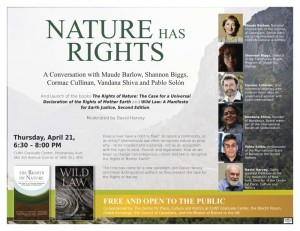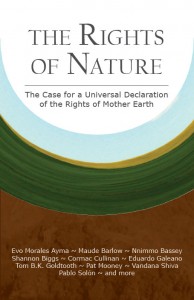 The following is written by Shannon Biggs, Director of the Global Exchange Community Rights Program. She will be at the United Nations on Thursday for a conversation about the rights of nature.
The following is written by Shannon Biggs, Director of the Global Exchange Community Rights Program. She will be at the United Nations on Thursday for a conversation about the rights of nature.
—
This week, at the apex of the anniversary of the Gulf oil disaster and Earth Day, a bold question is being asked at the United Nations for the very first time: What if nature had rights?
How different would our world look if Mother Nature could hire a lawyer and take polluters to court for full restoration of damaged ecosystems? Under current law, nature is nothing more that human property, like a slave. Property can’t have rights, and only rights-holders can sue for damages.
From major cities like Pittsburgh, PA to the politically conservative rural heartland, where nearly two-dozen US communities have passed local laws recognizing nature’s rights to “exist, flourish and evolve”, the movement for nature’s rights is growing. And of course its not just bold US municipalities seeking to protect their local ecosystems (and by extension, their own health safety and welfare.) The nations of Ecuador and now Bolivia have passed laws recognizing nature’s rights.
Wednesday, April 20 marks the United Nations debate on nature’s rights, put forward by Bolivia, and is the first step toward what many believe will culminate in the adoption of the Universal Declaration on the Rights of Mother Earth in the months to come. A companion piece for the Universal Declaration on Human Rights, this emerging Declaration — backed by enforceable laws around the world — seeks to wholly redefine our human relationship with all other species from one of dominance to one of harmony.
Speakers in this historic debate include:
- Vandana Shiva
- Martin Khor
- Cormac Cullinan
- Pablo Solon Bolivian Ambassador to the United Nations (and 2011 GX Human Rights Award winner)

Global Exchange will be at the United Nations to blog live on the happenings, and along with our esteemed colleagues Vandana, Cormac, Pablo Solon and Maude Barlow, will be discussing the Rights of Nature, the United Nations debate as well as launching our new book, aptly called Rights of Nature: The Case for the Universal Declaration on the Rights of Mother Earth.